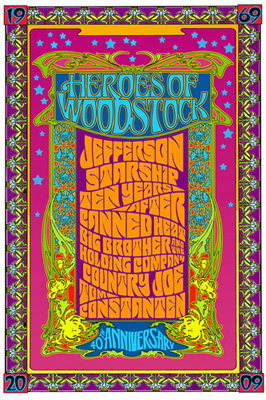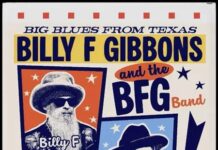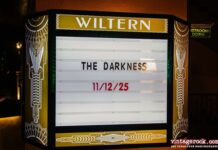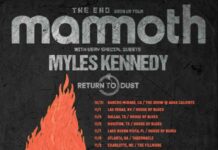Review by Shawn Perry
If you thought putting the original Woodstock together was a lot of work, think of the logistics of taking Woodstock on the road 40 years later. Most of the festival’s biggest and brightest stars are either dead, retired or above the fringe of a package tour. That didn’t leave much to pick from, but plenty for the imagination to ponder. Fortunately, a few key players were available to pull it all together: Country Joe McDonald, Big Brother & The Holding Company, Canned Heat, Ten Years After, Jefferson Airplane, plus a few special guests along the way.
Not only did the gathered troupe, dubbed Heroes of Woodstock, assemble to play the actual site of the festival (now the Bethel Woods Center for the Arts in Bethel, New York) on the 40th anniversary date (August 15) — they also took the show out for a month-long tour, including a stop at the Greek Theatre in Los Angeles.
Instead of three days of peace and music, fans had a little over three hours to soak up the Woodstock experience with those who were there. Country Joe McDonald, a man whose name is practically synonymous with the Woodstock movement (if, in fact, it was a “movement”), was brought in as an anchor to do the same thing he did at the original festival: play politically charged folk songs while roadies scramble to set up gear for the next band (unfortunately, Bill Graham wasn’t there to give him a bear hug).
McDonald’s songs may have functioned as filler, but it wasn’t without merit. When he started in with his infamous “Fish Cheer / I-Feel-Like-I’m-Fixin’-To-Die Rag,” the crowd was with him, joining in on the nasty spelling bee (“Gimme an ‘F’…Gimme a ‘U’…Gimme a ‘C’…”) before singing the chorus to one of the most satirical protest songs ever written. “And it’s one, two, three/What are we fighting for?/Don’t ask me, I don’t give a damn/Next stop is Vietnam…” McDonald, donning a Hawaiian shirt (usual attire among Woodstock alumnus), would continue to drop in and out over the next three hours. He was a welcomed distraction.
The first band to play wasn’t even at the original festival; however, their former lead singer was one of its main attractions. Big Brother & The Holding Company was here to present a respectful tribute to the fallen Janis Joplin. The band’s original guitarist Sam Andrew (who played Woodstock with Joplin and the Kozmic Blues Band), bassist Peter Albin and drummer David Getz were joined by guitarist Ben Nieves and Sophia Ramos.
Naturally, for their short set, the group rolled out nothing but vintage Joplin — the dreamy “Summertime,” “Me And Bobby McGee,” “Piece Of My Heart” and “Ball And Chain.” Ramos, doing her best to fill some big shoes, may have been too on the mark for the gig. For all the range and soulfulness she exuded, Ramos lacked the raunchy roar and erratic characteristics that made Joplin’s voice so unique.
Canned Heat, whom Country Joe sat in with, came on next and played one of the evening’s best sets. Drummer Adolfo “Fito” de la Parra, the band’s singular mainstay, managed to bring original bassist Larry Taylor and longtime guitarist Harvey Mandel back into the fold a couple of years ago, so the stage was brimming with three Woodstock veterans accompanied by guitarist Barry Levenson, bassist Greg Kage, and guitarist and vocalist Dale Spalding.
Opening with “On The Road Again,” the vibe of Woodstock started to take hold. The band fell into a boogie and the crowd followed suit .Fito sang “Going Up The Country” with Kage tooting on the flute and it was 1969 all over again. Actually, the crowd remained seated for most of the concert, but there were moments of excitement and Canned Heat was working it.
Wilbert Harrison’s “Let’s Work Together” put the spotlight on Taylor, who switched back and forth on bass with Kage but dominated this time out on slide guitar. Mandal also got in his chops, playing some “psychedelic gospel” at one point and revisiting a snippet of “Star-Spangled Banner,” likely in honor of Jimi Hendrix’s immortal Woodstock performance. When it came time to finish up, Canned Heat went out with a long, mostly improvised “Woodstock Boogie,” as clips of the band with founding members Alan “Blind Owl” Wilson and Bob “The Bear” Hite playing the 1969 festival flashed on the screen.
A few minutes after Country Joe mumbled something about it being dark, Ten Years After came on. This was the one band who plodded through a muddy set at Woodstock, only to redeem themselves with “I’m Going Home,” a 50s style rave-up enhanced by the guitar work and vocals of Alvin Lee. Now, here was Ten Years After without Alvin Lee, and the Greek was abuzz with what was going to happen next.
Drummer Ric Lee, bassist Leo Lyons and keyboardist Chick Churchill have been flying the flag since 2003 with guitarist and vocalist Joe Gooch out in front. At first, during the first furry notes of “Love Like A Man,” it was difficult to gauge the audience’s reaction. Steering away from newer material, the group locked in as Gooch played the type of swirling leads his predecessor was famous for. Although he lacked the sheer speed and power on the guitar — and guttural vocals — of Alvin Lee, Gooch did his best to break bread with the assembled over “50,000 Miles Beneath My Brain” and “I’d Love To Change The World.”
Lyons, Churchill and Ric Lee, each with brief solo segments, were burning a fire under Gooch as he wailed through “Good Morning Little Schoolgirl.” It was time to tackle the unavoidable: “I’m Going Home.” For an authentic edge, everyone but Gooch experienced equipment issues during the group’s set. Ever the professionals, they trudged onward and delivered a fine performance.
Country Joe returned with a spirited take on Johnny Cash’s “Ring Of Fire” along with his own “Save The Whales.” At one point, the chorus changed to “ring of feedback” as additional adjustments were made. Finally, McDonald was joined by various members of Jefferson Starship — guitarist Mark “Slick” Aguilar, vocalist Cathy Richardson, and vocalist/guitarist David Freiberg (an original member of Quicksilver Messenger Service). Eventually drummer Donny Baldwin assumed the drum throne, Chris Smith jumped up behind his keyboards, Paul Kantner strapped on his guitar and the Starship lifted off with “3/5 Of A Mile In 10 Seconds,” before shifting into cruise mode for “The Other Side Of This Life.”
Richardson took a gutsy run at “White Rabbit” and brought the audience to its feet. As it turns out, she’s sang with Big Brother before, and her “Janis Joplin” side occasionally surpassed any inclinations toward the cool, suave approach of Grace Slick. No, it wasn’t “morning maniac music,” but it still worked. Kantner had all but disappeared (he apparently does that regularly at shows), some of the other musicians were hanging about, and all of sudden, former Grateful Dead keyboardist Tom “TC” Constanten started blissfully plucking out the graceful notes of “Mountains On The Moon.” He was sprite and nimble as a jam ensued, morphing into “Turn On The Love Light.”
Kantner finally stepped it up on “Wooden Ships” and the group finished up with “Somebody To Love.” In a few moments, the stage was overflowing with members from all the evening’s bands, and everyone joined together on the Beatles’ “With A Little Help From My Friends” ala Joe Cocker-style. Richardson and Ramos shared the vocals as the rest of the players parlayed their talents to make this “all-star” gathering something special. But then they went off and dug out “Volunteers” and revolution was the air. Then the lights came on and it was back to reality. Woodstock feels like a dream that needs to be shaken off and relived, if only for the music.
Although one could register disappointment in the absence of so many others who could have been there (Where was Mountain? Johnny Winter? Richie Havens?), Heroes of Woodstock was a trip back in time I won’t soon forget. Other festivals may pop up, movies and books and compilations on those three special days in August 1969 can occupy your library for an eternity, but a night of the music will always soothe the soul. I can hardly wait to see what they cook up for the 50th anniversary.




















